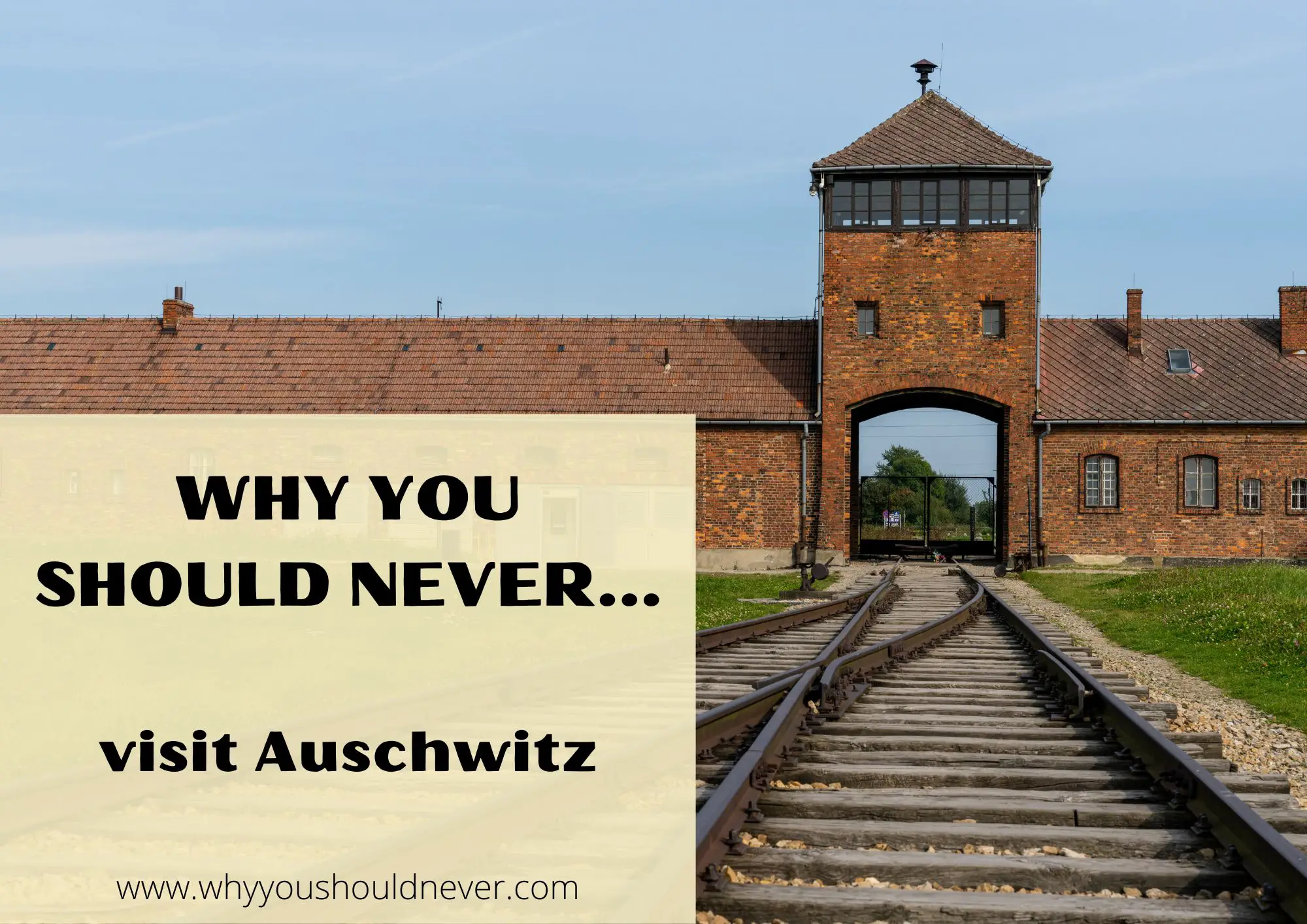![]()
Why You Should Never Visit Auschwitz
You’re probably furrowing your brow right now, thinking, “What on earth is this? Why should I never visit Auschwitz?” Bear with me here. It’s not that I’m attempting to downplay the historical significance of this harrowing site or suggesting we ignore the lessons it offers. Far from it.
Auschwitz, the largest of the Nazi death camps during the Second World War, is a stark, gruesome reminder of one of humanity’s darkest chapters.
Every year, countless individuals journey to this memorial site, drawn by a potent mix of fascination, horror, and a yearning to understand the extent of human cruelty. It’s a place for silent reflection, an opportunity to pay respects, and a call to ensure history never repeats itself.
However, this isn’t a journey everyone should undertake, and I’m here to shed light on why.
9 reasons why you shouldn’t visit Auschwitz
1. The emotional toll is immense
Auschwitz is a visceral testament to human suffering and visiting the site can be psychologically harrowing. The remnants of the genocide, the crude living quarters, the gas chambers – they all serve to depict the atrocities of the Holocaust with a stark reality that can be emotionally overwhelming.
It’s a grim experience, one that can lead to lingering feelings of sadness, anger, and despair. If you’re someone already grappling with emotional instability, this could add fuel to the fire.
2. Dealing with the palpable distress
Even for the emotionally strong, the distress that permeates the atmosphere at Auschwitz is palpable. You’re walking on grounds where an estimated 1.1 million people were systematically murdered.
That’s not something you can easily shake off or detach yourself from. The distress is heavy, oppressive, and can drain you physically and mentally. It’s a visit that requires fortitude, both of mind and spirit.
3. Not an educational tour for everyone
While Auschwitz provides an in-depth, first-hand account of the Holocaust, it’s not the ideal educational platform for everyone, especially children, Ashkenazi Jews, or those who may find the horrific realities too disturbing.
Yes, it’s important to teach about the Holocaust, but the visceral experience of Auschwitz might not be suitable or constructive for all audiences.
4. Dark tourism’s ethical questions
Visiting Auschwitz falls under the umbrella of “dark tourism”, which involves traveling to sites associated with death, suffering, or the seemingly macabre. Some folks question the ethics of this, believing that it may inadvertently commercialize or trivialize the suffering experienced.
While that’s not an inherent issue with visiting Auschwitz itself, if you’re uncomfortable with the potential ethical implications, it may be best to learn about the Holocaust through other means.
5. Dealing with potential insensitivity
Unfortunately, not every visitor to Auschwitz approaches the site with the reverence it warrants. There have been instances of visitors taking inappropriate selfies, behaving disrespectfully, or treating the visit as a casual tourist stop.
If you find such behavior deeply unsettling or offensive, it’s something you might end up encountering at Auschwitz, so you have been warned.
6. The potential for desensitization
Overexposure to graphic images and disturbing realities can lead to desensitization. There’s a risk that the shocking nature of Auschwitz could numb your emotional response to the tragedy, instead of enhancing your understanding and empathy. While this isn’t a given, it’s certainly something to consider before visiting.
7. The lingering psychological effects
The experience of visiting Auschwitz could have long-term psychological effects. Some people may develop symptoms of post-traumatic stress disorder, anxiety, or depression after visiting such a harrowing site.
These potential consequences should not be taken lightly, particularly if you’re already managing mental health challenges.
8. Nightmares post-visit
To piggyback off the previous point about the psychological toll, let’s talk about something a bit more specific: nightmares. Auschwitz, with its chillingly brutal history, isn’t exactly the stuff of sweet dreams.
The haunting images, the remnants of a horrific past, the stories of unthinkable human cruelty – they can all seep into your subconscious.
It’s not uncommon for visitors to report nightmares or disturbing dreams following their visit. If you’re someone who’s susceptible to such experiences, this is another reason to think twice before booking that trip.
9. Location
Here’s something practical for you: Auschwitz is in Poland, Eastern Europe. If you’re not already residing in or close to Poland, or if you don’t have plans to tour Europe anytime soon, then visiting Auschwitz would involve a considerable amount of travel. And with travel comes cost, time, and a whole bunch of logistical planning.
Then there’s the less obvious concerns about how you might be received in that part of the world. If you belong to a certain ethnicity or national background, you may need to consider local attitudes, potential biases, or even prejudices.
While Poland is largely hospitable and welcomes tourists from all walks of life, it’s always wise to research the sociopolitical climate of a place before visiting. This becomes particularly important if you’re traveling solo or if you’re part of a marginalized community.
Final thought
Before you pack your bags for Auschwitz, I urge you to ponder these points carefully. There’s no denying that it’s a place of immeasurable historical significance, a somber testament to a chapter of our history we must never forget.
However, the visit’s toll can be high, not a journey everyone is equipped to take.
Whether you decide to go or not, just know that understanding and remembering the Holocaust doesn’t necessitate stepping onto Auschwitz’s grounds. It’s about fostering empathy, standing against prejudice, and vowing to ensure such an atrocity never happens again. No plane ticket required for that.
